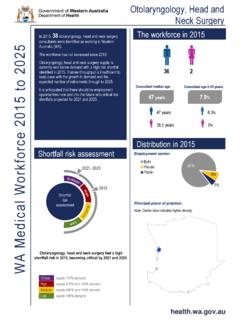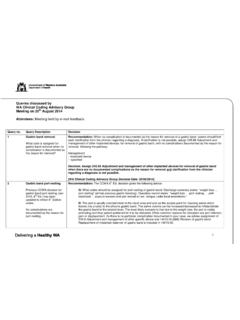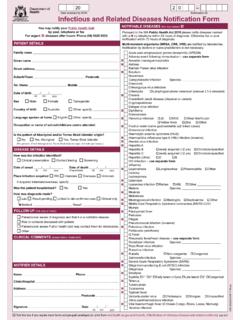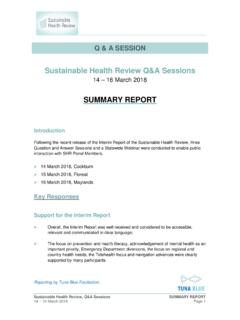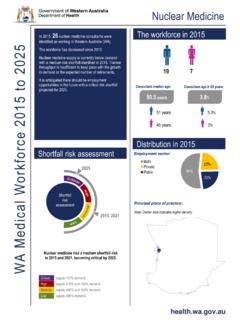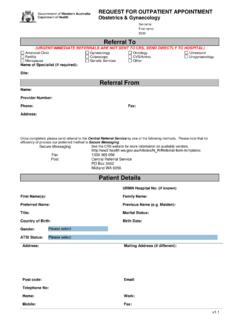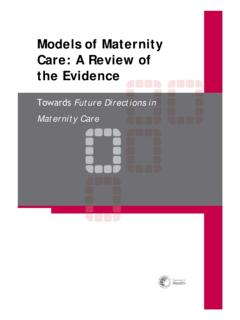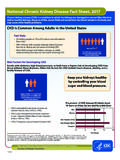Transcription of Clinical Reference Group Communiqué December …
1 Clinical Reference Group communiqu December 2017 This update highlights key discussions and considerations from the second meeting of the Sustainable Health Review (SHR) Clinical Reference Group held on 25 October 2017 and the joint meeting with the SHR Consumer and Carer Reference Groups held on 22 November 2017 . Engagement Reference Group members were actively involved in a number of targeted engagement activities with specific Clinical stakeholder groups to encourage submissions to the Review and increase attendance at public forums.
2 Reference Group members also participated in a number of regional Clinical consultations. Several Reference Group members are participating in working groups to develop discussion papers on key themes for the Review to be published following the release of the SHR Panel s interim report in early 2018. Challenging Issues Discussions The Reference Group was invited to provide advice on a number of challenging issues: 1. Whether the core focus of the SHR should be on preventing acute hospital admissions for the frail and multi-morbid elderly, and those with terminal illness in the last 12 months of life; 2.
3 Should all acute admissions for high risk groups be subject to an overt risk versus benefit analysis and whether this analysis is best conducted by clinicians in an Emergency Department; and 3. How can we better coordinate regional and remote patients that require tertiary care. Key points from the discussion: Consensus for clearly coordinated and mandated flows for country-metro across all services and direct hospital to hospital relationships. This will involve short term inconvenience (breaking of legacy and bespoke links) for longer term gains in experience, health outcomes, quality, coordination, efficiency, relationships and workforce training.
4 Support for access to the single patient record and the benefits to coordinating care. This links to data sharing, ICT systems, practice/culture across services, sectors and consumers, and will improve many elements of quality/experience/cost-reduction across the system. Support for using technology such as Health Engine to divert Emergency Department admissions. Expand or use this technology for outpatient appointments. Agreement that Telehealth should be expanded for specific areas of need like aged care and via a staged approach.
5 Suggested system-wide reform process to increase coordination of services with the primary care sector. Health Promotion and Prevention must have a big presence in this review proven long-term benefits but with longer lead times. At the joint meeting the Reference Group members discussed and provided advice on challenging issues with a particular focus on practical solutions that work for clinicians and consumers and carers. Key points from their discussion; More consistent end of life discussions The members agreed that the language and setting are critical components to end of life discussions, as well as the integral role of community services and GPs.
6 The potential for widening SHR Clinical update August 2017 2 the use of advanced health directives that assist people to plan a natural death according to their wishes was explored from the perspective of both clinicians and patients. The role of the residential care facilities was discussed, as well as ways the health system could provide more support to people who are close to the end of their life with good care plans. Both clinicians and consumers agreed that planning needed to play a more active part in end of life services - the Emergency Department is not the best place to start the discussion.
7 Megatrends impacting sustainability The members discussed the big issues that impact the sustainability of our health system specifically chronic diseases, obesity, inequality and wealth disparity, drug and alcohol issues. The Group also considered climate change and the associated health problems the population will face as temperatures increase, as well as whole of government approaches to address these macro issues, ways to fund programs and ways to drive change in the community. Data sharing Both consumers and clinicians agreed that increased information sharing could have positive effects on the delivery of care and patient outcomes if done in a secure environment.
8 The groups discussed building on existing initiatives, privacy for consumers, and the need for integrated systems. Increased uptake of telehealth Discussion centred on new ways to use the existing technology and barriers from the perspective of consumers and clinicians that may be restricting its use. Better ways to coordinate patient transfers from regional areas to metro areas The Group discussed several alternative models for linking tertiary hospitals with regional hospitals for the purpose of better coordinating patient transfers from regional areas to metro areas.
9 It was agreed that the problem needs more coordination between State-funded, not-for-profit and Commonwealth funded services so that they work together to minimise waste. Next Meeting The next meeting for the Clinical Reference Group will be scheduled for early 2018. Further information Email: Website: 2
